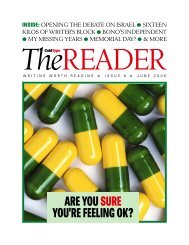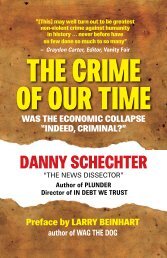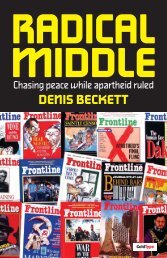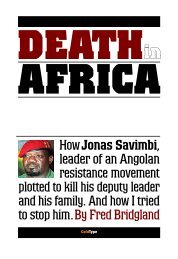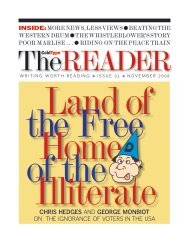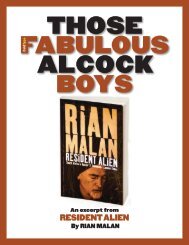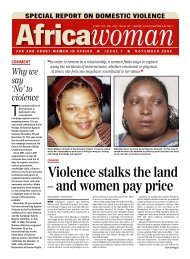UPDATED - ColdType
UPDATED - ColdType
UPDATED - ColdType
- TAGS
- updated
- coldtype
- coldtype.net
Create successful ePaper yourself
Turn your PDF publications into a flip-book with our unique Google optimized e-Paper software.
studs? Were readers and viewers well-served or<br />
deluged with confusing information? And what<br />
does all of this portend for coverage of future<br />
wars?<br />
Please realize: I am not against the press, nor<br />
dismissive of the enterprise, hard work and<br />
tenacity shown. Many of our reporters were<br />
brave, most hard working and a few even brilliant<br />
in the stories they filed. I can’t fault the<br />
technique or the way in which they worked to<br />
give us an insider’s seat at a war. The technology<br />
was amazing and some of the imagery unforgettable.<br />
At the same time, one must ask, what was the<br />
cumulative impact of this news army, what are<br />
the stories that went uncovered in a heavily<br />
managed system? Bear in mind that propaganda<br />
works best when you are unaware of it. Censorship<br />
is most effective when it is subtly achieved.<br />
Without “shooting the messenger” we can and<br />
must evaluate the message, its social meaning<br />
and political effect.<br />
There has been a gradual erosion of the adversarial<br />
stance of many on high-status beats,<br />
reporters who appear to be seduced by the aura<br />
of power and the prestige of those whom they<br />
have been assigned to cover.<br />
The White House correspondents’ dinner is a<br />
case in oint. Journalists there were “em-tuxedoed,”<br />
socializing with war makers. It is one<br />
thing to be polite. It is another to be co-opted.<br />
President Bush knew he had a friendly crowd<br />
to wow and woo. He spoke eloquently of journalists<br />
he knew who died, especially the conservative<br />
Michael Kelly, without touching on any of<br />
the issues that worry advocates of free expression.<br />
He was preaching to those who should be<br />
watchdogs, who should be scrutinizing his poli-<br />
WINNERS AND LOSERS<br />
45<br />
cies, not complicit in his project.<br />
There was no dissent shown from any of these<br />
correspondents and stenographers of power,<br />
nary a negative word. Instead, they cheered.<br />
They cheered. At one point, the outgoing president<br />
of the White House Correspondents Association<br />
commented that some reporters had<br />
even suggested that anti-war musicians like the<br />
Dixie Chicks or Harry Belafonte be invited to<br />
entertain. He scoffed at that proposal. “Imagine!”<br />
he sneered. “You can’t make this stuff up.” He<br />
was right on that point. You can’t make this stuff<br />
up. ●<br />
WAR AS NEWS BECOMES<br />
WAR AS HISTORY<br />
NEW YORK, APRIL 23, 2003 – The non-stop<br />
news cycle turns instant events into history with<br />
a new rapidity. Soon we will be flooded with<br />
books, videocassettes and documentaries about<br />
Operation Iraqi Freedom through a media recycling<br />
operation already in high gear.<br />
New media products offer one way of amortizing<br />
the investment in so much news coverage.<br />
But it is also a way of reinforcing the U.S. TV<br />
view that good has triumphed over evil, that the<br />
war was welcomed and worth it. Soon, the News<br />
Business will start handing out awards for best<br />
coverage by an embedded journalist under fire<br />
and, later, memorial plaques for those who died.<br />
Our heroism and valor cannot be forgotten.<br />
What is needed more is real introspection and<br />
a critical reassessment. Were some media outlets<br />
acting more like publicists and promoters of<br />
the war than journalists with a duty to remain




